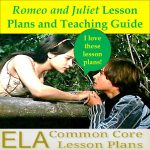
It’s not always easy to focus on literary terms quizzes.
While you were lounging by the pool this summer, I was writing Romeo and Juliet quizzes while lounging by the pool. These Romeo and Juliet literary terms quizzes can be found on the miracle we call the Internet.
They’re interactive. They’re fun not entirely boring. They cover the following ELA Common Core Standards set forth by the almighty, all-knowing, all-caring, big brother we call the Federal Government, which has coerced persuaded a multitude of states to adopt them (including my favorite, the Silver State).
Here are the quizzes.
- Act II, Scene iii quiz: Friar Lawrence rambles about weeds.
- Balcony quiz: I’m sure you’re familiar with the balcony scene.
- Romeo and Juliet Prologue quiz: Where it all begins.
Here are the standards.
L.9-10.3 Apply knowledge of language to understand how language functions in different contexts, to make effective choices for meaning or style, and to comprehend more fully when reading or listening.
L.9-10.4 Determine or clarify the meaning of unknown and multiple-meaning words and phrases based on grades 9-10 reading and content, choosing flexibly from a range of strategies. Use context (e.g., the overall meaning of a sentence, paragraph, or text; a word’s position or function in a sentence) as a clue to the meaning of a word or phrase.
L.9-10.5 Demonstrate understanding of figurative language, word relationships, and nuances in word meanings.
L.9-10.5a Interpret figures of speech (e.g., euphemism, oxymoron) in context and analyze their role in the text.
L.9-10.5b Analyze nuances in the meaning of words with similar denotations.
L.9-10.6 Acquire and use accurately general academic and domain-specific words and phrases, sufficient for reading, writing, speaking, and listening at the college and career readiness level; demonstrate independence in gathering vocabulary knowledge when considering a word or phrase important to comprehension or expression.
RL.9-10.4 Determine the meaning of words and phrases as they are used in the text, including figurative and connotative meanings; analyze the cumulative impact of specific word choices on meaning and tone (e.g., how the language evokes a sense of time and place; how it sets a formal or informal tone).
Last Updated on May 5, 2017 by Trenton Lorcher
Share This:
